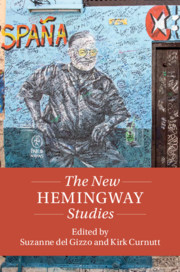Book contents
- The New Hemingway Studies
- Twenty-First-Century Critical Revisions
- The New Hemingway Studies
- Copyright page
- Contents
- Contributors
- Introduction Hemingway in the New Millennium
- Part I The Textual Hemingway
- Chapter 1 Shaping the Life
- Chapter 2 Hemingway and Textual Studies
- Chapter 3 Correspondence and the Everyday Hemingway
- Chapter 4 Object Studies and Keepsakes, Artifacts, and Ephemera
- Chapter 5 Digital Hemingway
- Part II Identities
- Part III Global Engagements
- Works Cited
- Index
Chapter 2 - Hemingway and Textual Studies
from Part I - The Textual Hemingway
Published online by Cambridge University Press: 30 August 2020
- The New Hemingway Studies
- Twenty-First-Century Critical Revisions
- The New Hemingway Studies
- Copyright page
- Contents
- Contributors
- Introduction Hemingway in the New Millennium
- Part I The Textual Hemingway
- Chapter 1 Shaping the Life
- Chapter 2 Hemingway and Textual Studies
- Chapter 3 Correspondence and the Everyday Hemingway
- Chapter 4 Object Studies and Keepsakes, Artifacts, and Ephemera
- Chapter 5 Digital Hemingway
- Part II Identities
- Part III Global Engagements
- Works Cited
- Index
Summary
Textual studies scholar Robert Trogdon, currently editing the Library of America edition of Hemingway’s 1922–1926 stories and novels, argues that textual criticism of Hemingway has largely been stunted for two decades. The main culprit has been the Sonny Bono Copyright Extension Act, which in 1998 added twenty years to the traditional limits of copyright to ninety-five years. As a result, major novels such as The Sun Also Rises and A Farewell to Arms are only now approaching public domain. Trogdon argues that in the meantime a surprising amount of textual corruptions have been allowed to pass from edition to edition through Hemingway’s publisher, Charles Scribner’s Sons, and through the Hemingway estate. Detailing several rather striking typos, printer-induced errors, and even dropped lines of dialogue, Trogdon makes the case for a scholarly edition that would not only correct this errata but also restore Hemingway’s original intentions at moments he was restricted by obscenity and libel concerns to alter his manuscripts and typescripts. One such famous moment was Scribner’s refusal to print the word “cocksucker” in A Farewell to Arms; another was Maxwell Perkins’s insistence that he change an attack on F. Scott Fitzgerald in “The Snows of Kilimanjaro” to a fictional name.
Keywords
- Type
- Chapter
- Information
- The New Hemingway Studies , pp. 33 - 46Publisher: Cambridge University PressPrint publication year: 2020

